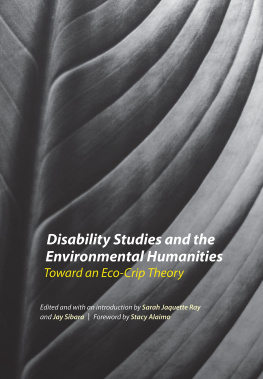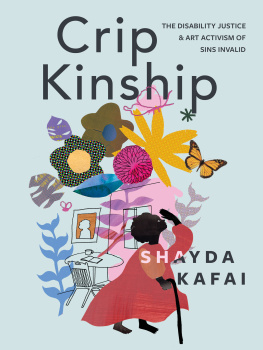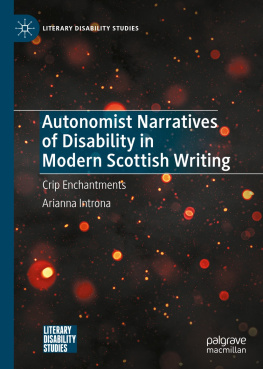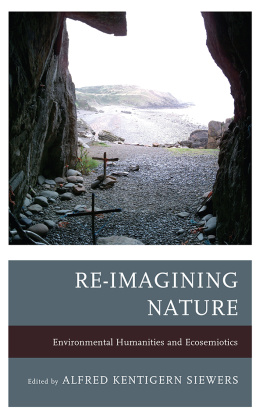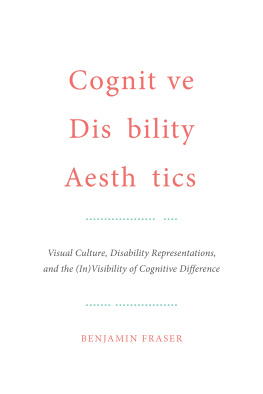Jay Sibara (editor) - Disability Studies and the Environmental Humanities: Towards an Eco-Crip Theory
Here you can read online Jay Sibara (editor) - Disability Studies and the Environmental Humanities: Towards an Eco-Crip Theory full text of the book (entire story) in english for free. Download pdf and epub, get meaning, cover and reviews about this ebook. year: 2017, publisher: University of Nebraska Press, genre: Politics. Description of the work, (preface) as well as reviews are available. Best literature library LitArk.com created for fans of good reading and offers a wide selection of genres:
Romance novel
Science fiction
Adventure
Detective
Science
History
Home and family
Prose
Art
Politics
Computer
Non-fiction
Religion
Business
Children
Humor
Choose a favorite category and find really read worthwhile books. Enjoy immersion in the world of imagination, feel the emotions of the characters or learn something new for yourself, make an fascinating discovery.
- Book:Disability Studies and the Environmental Humanities: Towards an Eco-Crip Theory
- Author:
- Publisher:University of Nebraska Press
- Genre:
- Year:2017
- Rating:3 / 5
- Favourites:Add to favourites
- Your mark:
- 60
- 1
- 2
- 3
- 4
- 5
Disability Studies and the Environmental Humanities: Towards an Eco-Crip Theory: summary, description and annotation
We offer to read an annotation, description, summary or preface (depends on what the author of the book "Disability Studies and the Environmental Humanities: Towards an Eco-Crip Theory" wrote himself). If you haven't found the necessary information about the book — write in the comments, we will try to find it.
Disability Studies and the Environmental Humanities: Towards an Eco-Crip Theory — read online for free the complete book (whole text) full work
Below is the text of the book, divided by pages. System saving the place of the last page read, allows you to conveniently read the book "Disability Studies and the Environmental Humanities: Towards an Eco-Crip Theory" online for free, without having to search again every time where you left off. Put a bookmark, and you can go to the page where you finished reading at any time.
Font size:
Interval:
Bookmark:
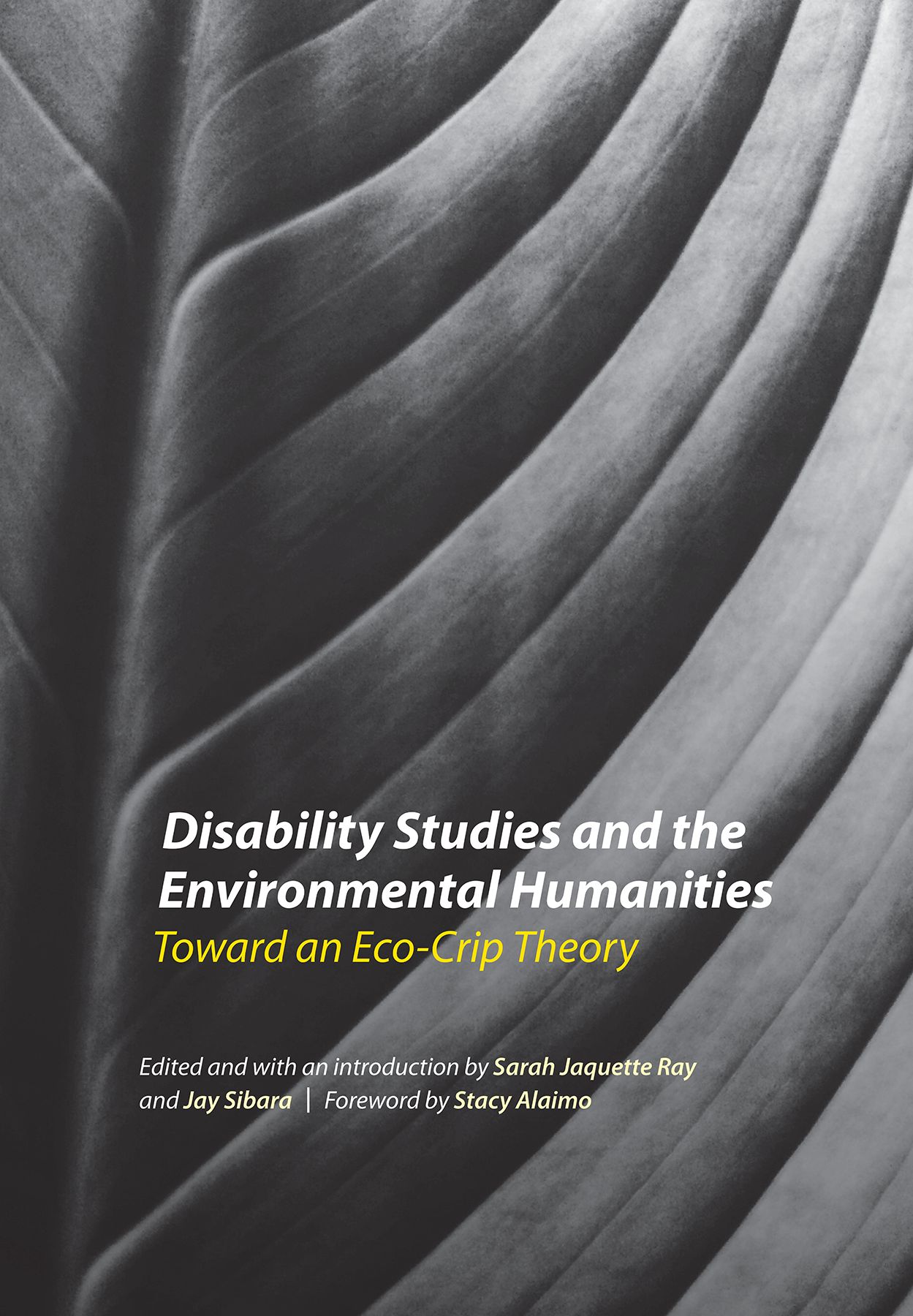
This is the most significant disability studies anthology to emerge in years. It is extremely important that these particular branches of academic and political work rub against each other.
Susan M. Schweik, professor of English at the University of CaliforniaBerkeley and author of The Ugly Laws: Disability in Public
Contributes to multiple fields, responding to growing curricular and scholarly interest in environmental humanities and disability studies.... This will be a foundational text in its own right.
Susan Burch, associate professor of American Studies at Middlebury College and coeditor of At the Intersections: Deaf Meets Disability Studies
Edited and with an introduction by Sarah Jaquette Ray and Jay Sibara
Foreword by Stacy Alaimo
University of Nebraska Press | Lincoln & London
2017 by the Board of Regents of the University of Nebraska
Cover designed by University of Nebraska Press; cover image Stocksy/Nemanja Glumac.
Acknowledgments for the use of copyrighted material appear in , which constitutes an extension of the copyright page.
All rights reserved
Library of Congress Control Number: 2017936592
The publisher does not have any control over and does not assume any responsibility for author or third-party websites or their content.
Sarah Jaquette Ray and Jay Sibara
Sarah Jaquette Ray
Valerie Ann Johnson
Mel Y. Chen
Anthony J. Nocella II
Matthew J. C. Cella
Alison Kafer
Eli Clare
Siobhan Senier
Cathy J. Schlund-Vials
Vctor M. Torres-Vlez
Julie Sadler
Kelly Fritsch
Anita Mannur
Natasha Simpson
Kim Q. Hall
Traci Brynne Voyles
Mary E. Mendoza
Jina B. Kim
Sarah Gibbons
David T. Mitchell and Sharon L. Snyder
Robert Melchior Figueroa
Elizabeth A. Wheeler
Stacy Alaimo
While we might wish that all our ethical and political commitments would align and become so beautifully articulated as to be inseparable and synergistic, it is nonetheless often the case that historically rooted discursive and ideological formations mean that ethics, politics, and scholarship take place within more messy, vexed, and contradictory terrains.Elizabeth A. Wheeler, in her essay in this collection, notes the devastating, even genocidal history of comparing people with disabilities to animals, which makes alliances between disability rights and animal rights as well as disability studies and animal studies terribly overburdened. And yet the work of Sunaura Taylor, Temple Grandin, Dawn Prince-Hughes, and others intrepidly fosters multispecies relations. In the pages that follow, Anthony J. Nocella II advocates for a philosophy of eco-ability, which brings together disability theory, animal advocacy, and ecology. The account of his own protests against dolphin captivity provides a striking example.
Projects that seek to connect disability studies with animal studies and environmentalism are often fraught, as such alignments are hardly natural but must instead be constructed and reconstructed through multiple positions, critiques, and rearticulations. It could even be the case that the conflicts arise not just from a lack of attention or a lack of dialogue but from more obdurate differences based in constitutive exclusions and overdetermined histories. Critiquing the values of stability and integrity in Aldo Leopolds Sand Country Almanac, a classic in environmental studies, with its influential concept of the land ethic, Kim Q. Hall writes that the devaluation of impurity and changing bodies and places... has informed heteronormativity, classism, racism, ableism, and sexism. Even if we shift our attention from canonical texts of environmental ethics to more contemporary environmental justice paradigms, we find that they are propelled by the ideal of natural, healthy bodies. Valerie Ann Johnson notes in her reprinted essay, Those of us in the environmental justice community are not immune to our societys standards of health, beauty, and normality. Indeed illness and disability may be evidence that environmental injustice has occurred. Jina Kim, in Cripping East Los Angeles, writes, While studies of environmental racism invariably reference disability to denote environmental harm, few if any address the phenomenon from a critical disability perspective.
Examining the physical and the conceptual in/accessibility of environments, environmentalism, and environmental studies is one starting point for cripping environmental studies and forging alliances between the fields. Starting from the other direction, disability studies could be enriched by attending to multispecies perspectives and ecological systems. Sarah Gibbons, for example, suggests an alliance between the environmental value of biodiversity and the concept of neurodiversity in her essay discussing the disconnect... between the concern that environmentalists express for rising diagnoses of autism and the struggle for equal rights for those with autism. Biodiversity, which remains rather problematic as a scientific category, is nonetheless invaluable during this era of the Sixth Great Extinction. Biodiversity stresses the value of each species but also insists that diversity is crucial for the workings of broader ecological systems. Siobhan Senier argues in her essay on blind Indians that for the most thoughtful scholars in environmental humanities, disability studies, and indigenous studies, systems are critically important. Senier explains that sustainability science and indigenous ecological knowledge enable us to understand these systems, insisting, however, that indigenous knowledge is utterly intertwined with indigenous sovereignty and not a free-floating commodity, ready to be lifted by settler colonials when they feel in crisis. Indigenous thought, environmental studies, and disability studies converge within epistemologies that are immersed, entangled, embodied, and political. Similarly posthumanisms, new materialisms, and ecomaterialisms may help crip the environmental humanities and extend disability studies beyond the anthropocentric as they traverse human/nonhuman divides, emphasize interactive material agencies, and encourage us to consider the human as part of assemblages with nonhuman species, as well as with technologies, substances, and prosthetics. Wheelers beautiful essay, Moving Together Side by Side: Human-Animal Comparisons in Picture Books, which concludes this collection, calls for a prosthetic community, a cluster of living beings, ideas, resources, and objects that enable disabled childrens full inclusion.
Disability Studies and the Environmental Humanities takes on the difficult challenge of working within both of these fields, putting forth multiple ways of critiquing, accessing, and recasting natural and cultural worlds. Many of the essays within this wide-ranging volume grapple with volatile conflicts and contradictions that are not readily resolved. Indeed, the epistemologies, ontologies, politics, and trajectories of disability studies and the environmental humanities often diverge. But it is precisely these bold attemptsthat refuse ready answersthat make this volume so significant, positioning it as an invaluable point of departure for further scholarship. Referencing Jack Halberstams model of unlearning, or negative forms of knowing, Jasbir Puar states that disability studies is already successful in this vein, undoing conventional ways of knowing and knowledge of the body, of capacities, of human and species variation. But she proposes something wilder: an overwhelming of modes of knowing such that what constitutes knowing itself becomes confused, disoriented, dissembled.an individually economically quantifiable toxic condition. While I disagree that toxicity itself is not a problem, the way toxicity leaks and disperses in metaphorical and discursive directions remains an issue for many intersectional political struggles. Natasha Simpson analyzes the intersectional quandaries in the food justice movement. The food justice movement is rightfully meant to center the experiences of poor communities of color; however, it also often centers specific notions of health, which can limit its relevance and impact for people with disabilitiesparticularly those with multiple oppressed identities. These essays challenge us to unlearn fundamental conceptions of toxicity and health, calling us to imagine how other key terms could be recast as part of new political movements attuned, simultaneously, to disability, environmentalism, and environmental justice.
Font size:
Interval:
Bookmark:
Similar books «Disability Studies and the Environmental Humanities: Towards an Eco-Crip Theory»
Look at similar books to Disability Studies and the Environmental Humanities: Towards an Eco-Crip Theory. We have selected literature similar in name and meaning in the hope of providing readers with more options to find new, interesting, not yet read works.
Discussion, reviews of the book Disability Studies and the Environmental Humanities: Towards an Eco-Crip Theory and just readers' own opinions. Leave your comments, write what you think about the work, its meaning or the main characters. Specify what exactly you liked and what you didn't like, and why you think so.

